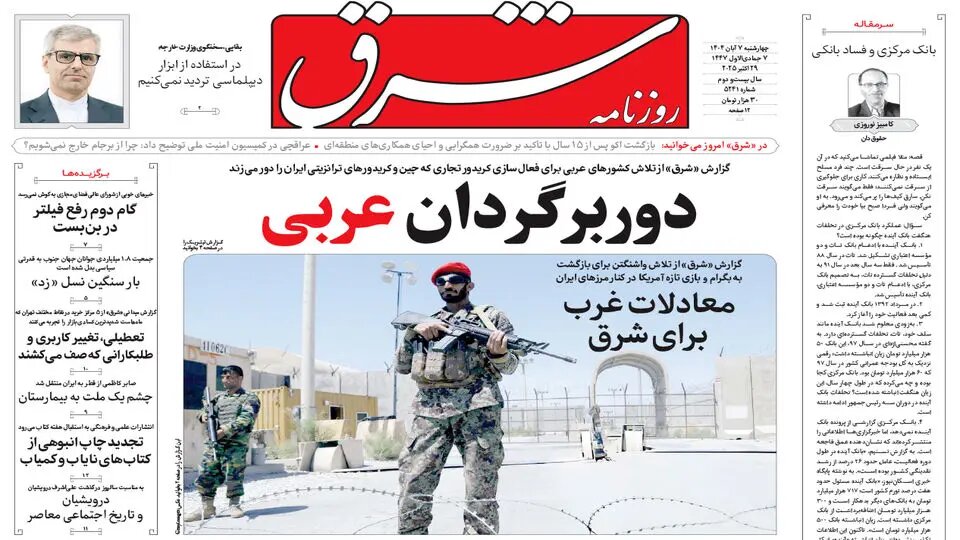No difference between Oman and Egypt on mediation

TEHRAN - In an interview with Shargh newspaper, Abdolamir Nabavi, a professor of Egyptian studies, examined Cairo’s motivations for mediation on the Iran nuclear issue.
He believes that while Cairo’s involvement may seem surprising compared to the long-standing mediation roles of Oman and Qatar between Iran and the West, it is understandable within the context of Egypt’s regional concerns and diplomatic ambitions. Due to its historical depth and complexity, the Iranian nuclear file tends to quickly acquire transregional dimensions whenever tensions arise. From this perspective, Egypt is concerned that escalating disputes between Iran and global powers—or recent clashes between Iran and Israel—could push the region into a new phase of instability, one that regional actors may no longer be able to contain. Thus, Cairo’s primary objective in engaging with this issue has been to manage the crisis and prevent its escalation. That said, the overarching goal shared by all mediators—Egypt, Oman, and Qatar alike—is to avert direct conflict between Iran and the United States or Iran and Israel.
Javan: Indigenous development and Iran’s regional outlook
The neighborhood policy, which has been a central pillar of the Islamic Republic of Iran’s foreign policy in recent administrations, is being pursued by the new government with an emphasis on constructive engagement, lasting stability, and endogenous regional development. Hosting the ECO summit and being actively involved in the event reflect the Islamic Republic’s political will to revive regional capacities, redefine economic and security linkages, and expand multilateral cooperation with ECO member states. At times when the region has taken on a security or military character, it has largely been due to the destabilizing presence and interventions of extra-regional powers. In this context, Dr. Pezeshkian’s proposal to establish a regional ECO police force (ECOPOL), strengthen law enforcement and judicial cooperation, and enhance border control and the fight smuggling and terrorism, presents a step toward building an indigenous, coordinated, and homegrown security architecture among regional countries.
Sobh-e-No: Iran’s foreign policy anchored in independence and balance
Sobh-e-No has analyzed Iran’s cooperation with China and Russia, arguing that a proper understanding of Iran’s current position in the global order is impossible without revisiting the principles of the Islamic Revolution. Iran does not seek to follow the East, nor does it accept Western dominance; rather, its goal is to establish balanced, equitable relations based on national interests. Accordingly, cooperation with China and Russia aligns with the strategic interests of the Islamic Republic. In recent years, unlike Europe and the United States, these two countries have stood by Iran and refrained from supporting Washington’s anti-Iran positions. It is therefore natural that expanding these ties forms part of Tehran’s broader strategy to counter Western pressure and strengthen Iran’s standing in a multipolar world order. Nevertheless, the pro-Western camp within Iran continues to hold a one-dimensional view of foreign policy. From their perspective, engagement with the West equates to progress, while any cooperation with the East signifies isolation and backwardness. In practice, this outlook has deprived the country of diverse international opportunities and caused many economic and technological prospects to be lost due to hesitation in decision-making or fear of Western reaction.
Iran: Regional convergence with centrality of Tehran
The Iran newspaper interviewed Behzad Azarsa, head of the ECO office, about the significance of the Economic Cooperation Organization headquarters in Tehran. He said ECO has now reached a level of maturity that connects 10 regional countries through economic, cultural, scientific, and political ties. Headquartered in Tehran, ECO has provided Iran with both strategic and political advantages. According to Azarsa, this is not only a reflection of Iran’s historical and political standing in the region, but also a strategic opportunity to strengthen economic, transit, and cultural linkages in an area where seven member states lack direct access to open waters. At a time when many regional institutions around the world are grappling with existential crises under the shadow of U.S. unilateralism and the weakening of international organizations, ECO has managed to preserve its vitality and relevance. Even during periods of political and economic restrictions caused by sanctions, it has delivered tangible benefits to Iran. Today, ECO offers Iran both a platform for new opportunities and a stage to showcase its strategic role in linking the East and the West as well as the North and South Asia.
Leave a Comment